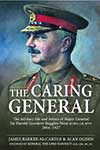|
THE CARING GENERAL
The military life and letters of
Major General Sir Harold Goodeve Ruggles-Brise KCMG CB MVO 1864-1927
by James Barker-McCardle and Alan Ogden

|
The Caring General is the first published biography of Sir Harold Goodeve Ruggles-Brise. Born to the distinguished family of Spains Hall, Essex, he was an outstanding soldier who saw active service in South Africa and on the Western Front in the Great War. Harold married into one of the most famous aristocratic families in Scotland: his wife was Lady Dorothea Stewart Murray, oldest daughter of the 7th Duke of Atholl. Drawing extensively on their previously unpublished letters and diaries, The Caring General paints a vivid picture of army life in the late 19th and early 20th centuries, the battlefield and the home front.
Born in 1864 Harold attended Winchester College and went up to Oxford. He excelled as a sportsman, particularly as a cricketer, playing for the MCC, Essex, and winning an Oxford Blue. Harold was a Grenadier, being commissioned into the 2nd Battalion Grenadier Guards and whilst stationed in Bermuda became a friend of Prince George of Wales. Lady Dorothea accompanied her husband on his posting to Gibraltar although he was soon to sail for South Africa as Brigade Major, Guards Brigade. This was Harold’s first experience of war and he distinguished himself on and off the battlefield. His letters are detailed and candid, covering some of the most significant characters and actions in the war. With mentions in dispatches and staff appointments with 9th and 11th Divisions behind him, Harold returned home and was awarded the Queen’s Medal with seven clasps.
At home, Harold was to mastermind the military element of Queen Victoria’s funeral before promotion to command of 3rd Battalion Grenadier Guards. He went on to hold the prestigious position of Commandant at the Hythe School of Musketry where soldiers received outstanding training in the use of rifle and machine-gun. The trumpet of war sounded in 1914 and Harold headed for Belgium in command of 20th Brigade, part of the famous 7th Division. In late 1914 they were to be found near Ypres, heavily outnumbered by German forces. During brutal fighting, 20th Brigade suffered appalling losses, the Grenadiers being decimated. Harold was stretchered off the battlefield with near fatal wounds.
After a painful recovery Harold commanded and trained 40th (Bantam) Division and headed for France. His letters describe life in the trenches near Lens, trench raids, the ruined Somme landscape, and attacks on key German positions. Returning home he commanded 73rd Division Home Forces before returning to France in 1918 as Haig’s Military Secretary. It fell to Harold to inform Sir Hubert Gough that he was being relieved of his command. Lady Dorothea served in a Voluntary Aid Detachment and her letters to Harold contain fascinating accounts as varied as her witnessing a fatal air raid on Hythe and having tea with the wife of Napoleon III.
In retirement Harold dedicated himself to supporting veterans, becoming General Secretary of The Officers’ Association. He died in 1927 having lived by both the motto of Winchester College, ‘Manners Makyth Man’ and Sandhurst, ‘Serve to Lead’.
Gray Fielding
Helion
www.helion.co.uk |
|

